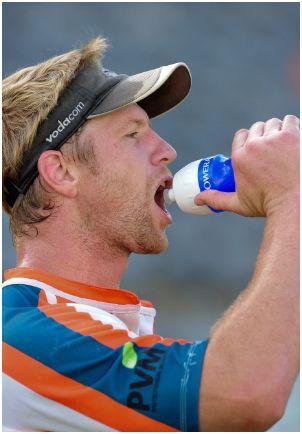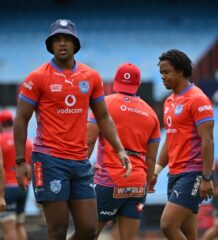What are the nutritional requirements of Super14 Rugby?

Nico Breedt
[Top Sports Scientist Ross Tucker looks at nutrition and its importance in top-level rugby]
A current member of Paul Treu’s successful SA Sevens management team, Tucker – in conjunction with Powerade, the official fuel to the Vodacom Super 14 players – continues to give useful insight into top-level sport and what is required to make the best players in world rugby tick.
Powering the physiology of a world-class rugby player is no easy task. Just as Ferrari and McLaren will spend considerable time testing and perfecting the fuel that goes into their racing machines, so too do dieticians, trainers and coaches worry about the fuel that drives a Vodacom Super 14 rugby player.
But why is nutrition so essential?
There is the obvious reason that players need energy during the 80 minutes, but the importance is even greater after the match. This is because over the course of a season, it determines whether a player is able to recover from one game to the next, and crucially, keep their muscle mass up as the stresses of play and travel gradually accumulate over more than 30 matches a year.
A few weeks ago, we looked at the physiological demands of an elite match, and saw that a player can burn between 1700 and 2000 kCal per game. This is about the same as a 90kg man running a half-marathon (21km). Because the game is played at such a high intensity, most of this energy comes from carbohydrates (sugar), and science has shown that a player can deplete the muscle and liver glycogen stores in the 80 minutes, effectively ‘running out of fuel’. If this happens, just as it would in the car analogy, the player cannot keep going, and premature fatigue occurs.
Therefore, players have to do two things: ‘top up’ the energy reserves before the match, and replace energy when they can, either at half-time or during breaks in play.
Both are simple enough to do, provided players have access to a light meal, energy bars or sports drink. Sports drinks provide the additional benefit of being a means to replace fluid, since research has shown that players can lose up to three litres in a match. From a hydration standpoint, players need to drink to thirst, and so provided players have access to energy and fluid during a match, game performance is not a large concern.
Far more challenging is recovery after matches. It can take three days to replace all the muscle glycogen that is burned during a match, even when a player is instructed to eat as much as possible.
If a player fails to replace the carbohydrates and energy, training quality is affected, and the player goes into what is called ‘energy deficit’, which can result in a loss of muscle mass. This has obvious negative consequences for a Super 14 player, but it is not uncommon to see a progressive decline in body mass over the course of the season. Bear in mind that for the top players, who go straight from Super 14 into Test matches, then Tri-Nations and Currie Cup and more Test matches, there’s no chance to regain this body mass until the end of year off-season break, so it’s doubly important to prevent it during the season. Most teams weigh players daily to make sure that they are not starting down this slippery slope, and will customise nutrition for players who do seem to be struggling.
So how much does a Super 14 player need? Given two hours a day of training, with a match every week, the target is eight grams of carbohydrate per kilogram of body mass daily. So for a typical 100kg forward, that’s about 800 grams per day. To give you an idea of just how much this is, there are 50 grams of carbohydrates in three medium sized potatoes. So, if the player is getting all their carbohydrates from potatoes, they have to put away 48 potatoes a day! Fortunately, there are many other sources, but the point is that replacing the carbohydrates may be more difficult than you might think, and it’s not surprising that players eat enough to feed a small army.
What about protein? Protein is important because it’s the main building block of muscle. Almost all professional rugby players supplement with protein shakes to aid recovery and to keep muscle mass up. Surprisingly, there is a lot of disagreement in the science about whether this is actually needed. The main factor helping keep muscle mass up, as we said earlier, is energy balance. Even if a player is eating only protein, they won’t gain mass unless the total energy intake is also high enough. However, a player with the energy demands of rugby also gains a small, but significant advantage from increased protein intake – the recommended amount is anything between two and four grams per kilograms (the 100kg flanker thus needs about 300 grams per day).
We’ve already amassed over a kilogram of food per day – 800 grams carbohydrate plus 300 grams of protein. Add to this the stress of travel through long-flights and time-zones (which also causes weight loss), and at least eight different hotels, and you see the magnitude of the challenge!
All our Super 14 teams will employ dieticians at some stage during the season to assist players with the customisation of diet. Also, most professional franchises now have academies and training bases where players eat together, their food being prepared by a dietician. And some even go so far as to help teach players – and their wives or girlfriends – how to shop and cook for healthy, performance-enhancing results! It is just another of many aspects that goes into a professional rugby team.
Ends
*Powerade Preservative Free Sports Drink is only available in ready-to-drink. Coca-Cola, Powerade and the P device are trademarks of The Coca-Cola Company © 2010
• Issued by Powerade, official fuel to the Vodacom Super 14 players.
Related Posts
« Sharks victorious in 23-10 battle with Blues Report on a highly successful Wildeklawer Schools Rugby Tournament »
















